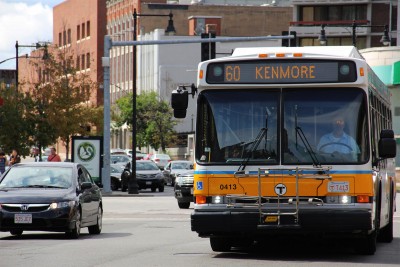
The Massachusetts Bay Transportation Authority is considering the privatization of bus services and maintenance work, according to a Sept. 1 report by the Fiscal and Management Control Board.
The potential privatization comes with the MBTA’s attempt to close a $100 million operating budget deficit, which is prompting them to consider “flexible” contracts within its systems, MBTA spokesperson Joe Pesaturo wrote in an email.
“With taxpayers contributing more than $1 billion annually to the MBTA it is incumbent upon T management to carefully examine and assess its performance across all service related functions, and identify areas where the Authority can maximize its limited resources and operate more efficiently,” Pesaturo wrote.
According to the report, transit agencies across the country have used outsourcing models for transit services to cut costs.
“More than 40 percent of U.S. public transit agencies currently contract out some or all of their bus systems in order to reduce costs,” the report stated.
The FMCB, which oversees financial, operational and managerial stability for the MBTA, has been working on methods to save the service money, since 85 percent of the total T costs are used for maintenance and operations, according to the report.
“The outsourcing flexibility the [Massachusetts] Legislature granted the MBTA is an important tool in the FMCB’s arsenal not just to save costs but to fix what is broken at the MBTA to help improve performance,” the report stated.
Plans to outsource workers for MBTA operations and maintenance have received backlash from labor unions, such as the Boston Carmen’s Union Local 589, which will hold a rally in front of the State Transportation Building Monday morning.
Privatization will put current workers at disadvantage, and the move is proof of the MBTA’s cost mismanagement, Local 589 president James O’Brien wrote in an email.
“The recent report issued by the Fiscal Management and Control board uses the same flawed logic that has shaped the MBTA reform debate for months — that outsourcing will somehow fix decades of neglect, woefully insufficient investment and a lack of leadership,” O’Brien wrote. “The hardworking men and women who keep the system running are being unfairly blamed for years of mismanagement.”
The FMCB report to privatize is still inconclusive, as “not all FMCB members agree on all board decisions and differing views are a natural part of the process as we collaborate together,” according to the report. One of the five FMCB members, Brian Lang, did not endorse the report.
Daniel Aldrich, a professor at Northeastern University, said although the MBTA’s plan could cut costs in the short run, it could cause problems in operation quality with outsourced workers who do not have the same experience as public workers.
“It’s definitely late,” he said. “In several areas, I would say, energy and transportation, especially, and also prisons, we have seen privatization and usually go back from it.”
Several Boston residents expressed the need for bus operations’ improvement, and said privatization could be beneficial as long as it brings real change.
Deborah Rossi, 61, of Brighton, said she wonders if the MBTA is utilizing its resources as efficiently as they should.
“There has been a lot of waste in the MBTA in the circumstances that has brought to where it is now, which is not in a really good place,” she said. “If it were up to myself, people would just need to be more responsible for the upkeep of anything that is public because it belongs to all of us.”
Ada King, 57, of Brighton, said privatization could be the solution to the MBTA’s shortcomings, especially when there are not enough buses, and the buses it does have are often delayed.
“Sometimes they have concerts or ball game[s], and they need extra buses,” she said. “I hope [privatization brings benefits] because we paid for the service, and we don’t receive it.”
Michael Andrews, 36, of Dorchester, said the MBTA has many issues, including the cutting of late night services. But if bus improvements aren’t made, Andrews said, the MBTA shouldn’t upset the union.
“Maybe [privatization] would benefit us, maybe it won’t,” he said. “If it doesn’t hurt anybody, doesn’t mess with the union, [or cause] inconvenience to anybody, then I’m all for it.”














































































































Gina Muci • Sep 26, 2016 at 4:09 pm
The state has an obligation to all the workers and their families who have worked for so many years on trying to keep an outdated system running. It is not the fault of workers for increasing costs. It is the fault of the state and past MBTA management for not updating equipment and trying to constantly repair aged and tired systems by paying premium for spare parts to replace the very aged parts or cannibalizing one bus to repair another. That is not the fault of the workers that do all the repairs. That is the fault of management, strictly shortsighted management that should have been making ongoing modernizations in past 10-15 years! So, now those same people want the “hands on” workers to pay by turning over their jobs to private companies and people unfamiliar with many issues? Make workers and their families suffer for sins of others? We owe those people our gratitude. Want to outsource? Try it gradually by limited outsourcing by not replacing people retiring!